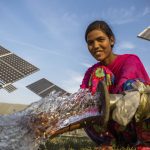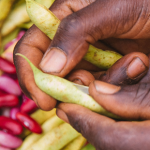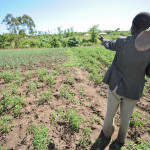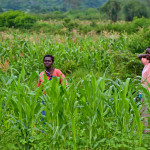Food systems fundamentally influence the environment of the planet, the livelihoods of billions of people (including most of the world’s poor), and the nutrition of every human being. Robust food systems can serve as catalysts for achieving the Sustainable Development Goals, but their current weaknesses are a major source of vulnerability to a variable and changing climate. IFPRI’s Knowledge […]
Climate change and variability: What are the risks for nutrition, diets, and food systems?
By Jessica Fanzo, Rebecca McLaren, Claire Davis, and Jowel Choufani
The paper uses a food systems approach to analyze the bidirectional relationships between climate change and food and nutrition along the entire food value chain. It then identifies adaptation and mitigation interventions for each step of the food value chain to move toward a more climate-smart, nutrition-sensitive food system. The study focuses on poor rural farmers, a population especially vulnerable to the adverse effects of climate change on nutrition, although we recognize that there are other vulnerable populations, including urban poor and rural populations working outside of agriculture. Although this report does not explicitly exclude overweight and obesity, it focuses primarily on undernutrition because this nutritional status is currently more prevalent than overnutrition among our target population.
Building Resilience in the Face of Climate Change and Weather Shocks – UPDATED
Building Resilience in the Face of Climate Change and Weather Shocks - Organized by IFPRI and the Chicago Council on Global Affairs “We have a broken food system today… Climate change is simply a threat-intensifier; it is making what is already perilous even more difficult.” - Rachel Kyte, Group Vice President and Special Envoy for Climate Change […]
Analysing climate resilience within the climate-smart agriculture concept
By Cecilia Schubert, CCAFS
Senior researcher Alex De Pinto from the International Food Policy Research Institute (IFPRI) recently took the stage at the high-level event Building resilience for food and nutrition security arguing that making sweeping statements on which climate-smart agriculture practice is preferable to another, given a set context, is extremely difficult. De Pinto also made the case that we need start differentiate between the two terms “climate resilience building” and “climate adaptation”, especially when talking about climate-smart agriculture.
Project: Increasing women’s resilience to climate change
What is the challenge? In recent years there has been considerable attention to "gender and climate change," focusing particularly on the adverse impacts of climate change on women. However, these studies often lack a systematic empirical basis (beyond localized or anecdotal examples); where data are available, they too are often limited to comparison of male-headed […]





